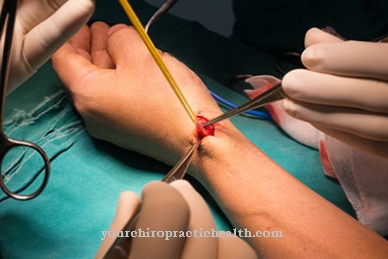A Inflammation of the salivary glands is an inflammatory disease of the salivary gland caused by bacteria or viruses, or by a Salivary stone arises. The medical name is Sialadenitis or Sialoadenitis. Typical symptoms of salivary gland inflammation are swelling in that area and severe pain.
What is salivary gland inflammation?
.jpg)
© sanjayart - stock.adobe.com
The Inflammation of the salivary glands is a very painful swelling of the large salivary glands. It can be one or both sides and is usually caused by viruses, bacteria or salivary stones.
Almost all of the saliva in a person's mouth is produced by six large salivary glands, which are arranged in pairs. The daily amount of saliva in an adult is estimated at 1.5 to 2 liters. These are the parotid, parotid and mandibular salivary glands.
There are also some small salivary glands in the throat, on the mucous membrane of the car and on the lips. However, these are much less affected by diseases. Usually older people suffer from the disease.But salivary gland inflammation also occurs more frequently in people with an immune deficiency.
causes
One is triggered Inflammation of the salivary glands mostly by bacteria or viruses. Mumps and the Coxsackie A virus are typical causes of this disease. In addition, salivary stones are often responsible for the inflammation of the salivary glands. They cause a backlog of saliva as they affect the duct of the affected gland.
As a result, a secretion is built up, which is an optimal breeding ground for bacteria. These in turn can cause inflammation. In addition, tumors, constrictions and scars can be responsible for the inflammation of the salivary glands.
Inflammation of the oral mucosa, which is caused by inadequate oral hygiene, is also one of the typical causes. In addition, medications which, as a side effect, reduce the flow of saliva can promote inflammation of the salivary glands.
Symptoms, ailments & signs
In the case of salivary gland inflammation, which in most cases only occurs on one side, the gland swells, becomes hard and painful. These symptoms can show up before the inflammation has developed. If the gland is inflamed, the overlying skin turns red and feels hot.
When pus forms, it often drains into the oral cavity or pushes out through the opening of the gland. When palpating the gland, the secretion can be felt as a movable mass. The symptoms worsen when eating. Chewing the food stimulates the formation of saliva. However, since the glandular ducts are obstructed by the saliva stone, the saliva cannot drain and thus presses on the inflamed and swollen tissue.
As a result of the blockage, the gland continues to swell. Patients feel sick and ailing, and sometimes they have fever and chills. The lymph nodes can also swell. When the parotid gland is affected, chewing is extremely painful and the mouth can hardly be opened.
In the acute form of the disease, the symptoms set in suddenly. Chronic inflammation, on the other hand, develops slowly and comes in spurts. It can appear on the right and on the left. Pus can also form in the chronic form. There are also salivary stones that are completely symptom-free.
Diagnosis & course
Diagnosing a Inflammation of the salivary glands takes place after a thorough examination of the salivary gland by the doctor. Usually he first feels the gland, and pus is often found in the mouth. The pus and blood are analyzed in the laboratory to determine the reasons for the inflammation of the salivary glands.
An ultrasound scan can also be useful to look for a stone, tumor, or abscess. In some cases, computed or magnetic resonance imaging is done. In the case of chronic inflammation of the salivary gland, a fine needle aspiration can also be considered.
Another diagnostic method is a so-called sialography. To do this, the doctor injects a contrast agent into the duct of the salivary gland in order to make the gland recognizable on an X-ray. If the salivary gland inflammation is prolonged, complications such as abscesses or tissue loss can occur.
Complications
If left untreated, inflammation of the salivary gland can lead to the formation of an abscess. This can penetrate the oral cavity, the ear canal or through the neck tissue and break open to the outside. If the bacteria get into the blood, blood poisoning can occur, which in the most severe case leads to organ failure and thus to death of the person concerned. In rare cases, inflammation can lead to facial paralysis.
In men, the condition can affect fertility. An untreated chronic inflammation of the salivary glands can also lead to scarring of the glandular tissue. This hardens the glands and the production of saliva decreases permanently, which promotes infections in the oral cavity and other complications. Autoimmune reactions against the cells of the salivary glands are also conceivable - secondary diseases such as Sjögren's syndrome and ultimately the destruction of the glands occur.
Very rarely, inflammation of the salivary glands is caused by a tumor that, if left untreated, can have serious consequences. Adverse events can also occur during treatment. Occasionally the prescribed antibiotics cause side effects or trigger allergic reactions. Surgery can cause bleeding, infection, and scarring. In the case of severe complications, the salivary gland must be completely removed.
When should you go to the doctor?
Inflammation of the salivary glands should always be treated by a doctor. This disease can lead to serious complications that make everyday life significantly more difficult. For this reason, a doctor should be consulted at the first sign of a salivary gland inflammation. The earlier the diagnosis and treatment of this disease takes place, the better the further course of the disease will usually be.
A doctor should be consulted if the person concerned suffers from significant reddening of the skin or from a severe rash. This usually also leads to the formation of pus and not infrequently also to an outflowing secretion. In many cases, those affected also experience discomfort when chewing or swallowing. Swollen lymph nodes or a very high fever can also indicate the salivary gland inflammation. The person affected can hardly open their mouth and therefore can no longer take any food or liquids.
The inflammation of the salivary glands can be treated by a general practitioner or an ENT specialist. In most cases, there are no special complications, and also a complete cure of the disease.
Treatment & Therapy
Justifies the Inflammation of the salivary glands in a bacterial infection, antibiotic therapy is advisable. Pain reliever and anti-inflammatory drugs are taken when the disease is caused by viruses.
With so-called saliva looseners, increased saliva production can be achieved, which is used to clean the salivary glands. In addition, salivary stones present in this way can be flushed out. Classic saliva stimulants are drinks, chewing gum and candies.
Salivary stones can also be destroyed or smashed with the help of a massage of the gland or extracorporeal shock wave lithotripsy. Ultrasonic waves are directed at the salivary stone so that it falls apart. They are usually flushed out through the flow of saliva. If this form of therapy is unsuccessful in the inflammation of the salivary glands, the larger particles must be surgically removed.
If there is an abscess, it must be split. This is the only way for the pus to drain away. A complete removal of the salivary gland is only necessary if the inflammation is repeated or a tumor is suspected.
If a malignant tumor has been diagnosed, the only suitable treatment method is to remove the diseased tissue and the salivary gland. Radiation therapy usually takes place afterwards. The appropriate treatment therefore depends largely on the causes of the salivary gland inflammation.
You can find your medication here
➔ Medicines against tartar and tooth discolorationprevention
One Inflammation of the salivary glands can only be prevented to a limited extent. Important prevention measures are adequate hydration and thorough oral hygiene and dental care. In addition, increased production of saliva can be a preventive measure, as it cleans the salivary glands and can flush out any salivary stones. This can be achieved by sucking sour candy. If a salivary stone is diagnosed, it should be removed preventively. This can also prevent salivary gland inflammation.
Aftercare
The course of a salivary gland inflammation depends on the causal factors and the treatment method chosen. The aftercare treatments and the follow-up examinations should also be differentiated accordingly. If the inflammation of the salivary gland is caused by bacteria, it can subside and heal completely within a few days with the right medication.
Follow-up treatment is not required in these cases. It becomes more problematic when the disease is based on autoimmune reactions, which are usually treated with glucocorticoids (cortisone). The aftercare treatments then aim to minimize the side effects of the cortisone treatment, such as water retention in the tissue, and to adjust one's own behavior so that the immune system is a little suppressed and therefore the risk of infection increases.
Salivary gland inflammation can also be triggered as a side effect of certain medications. There is then the risk of chronic inflammation of the salivary glands, which is difficult to combat. An effective follow-up treatment consists in finding an adequate substitute for the drug and ensuring that the drug causing the problem remains taboo in the future.
Medicines that have already been identified as possible causes of inflammation of the salivary glands include antidepressants, diuretics and antihistamines, as well as beta blockers and calcium antagonists. In many cases, viruses such as the Epstein-Barr virus, the mumps virus and the influenza virus are the cause of the disease. Special follow-up care after overcoming the virus infection is not necessary.
You can do that yourself
To support the organism, the immune system should be stabilized, especially in the case of inflammatory processes. With a balanced and healthy diet, sufficient exercise and the avoidance of harmful substances such as nicotine and alcohol, an improvement in one's own health can be achieved. In addition, sleep hygiene must be optimized. The daily rhythm should be adapted to the needs of the body and states of stress should be avoided.
A good work-life balance should be built in everyday life. A harmony between the fulfillment of professional duties and the design of leisure activities helps to maintain one's own health and contributes significantly to improving impairments. In some cases, inflammatory processes can regress on their own in a healthy body's own defense system. This requires sufficient rest and not a situation of overexertion or strong emotional stress.
If medical care is sought, the instructions of the doctor should be followed. Independent withdrawal from prescribed drugs can lead to an immediate deterioration of the overall situation. Good oral hygiene provides support in advance and during the healing process. Teeth should be thoroughly cleaned at least twice a day. In addition, regular participation in prophylaxis is highly recommended. Viruses and bacteria in the mouth area are removed in this way.


.jpg)
.jpg)


.jpg)





.jpg)



.jpg)










.jpg)
